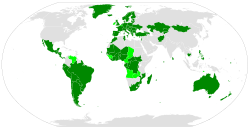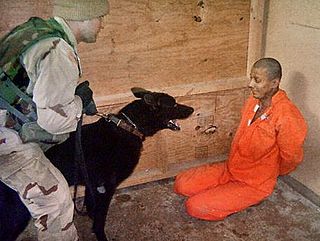| Optional Protocol to the Convention Against Torture and Other Cruel, Inhuman or Degrading Treatment or Punishment | |
|---|---|
 Ratified or acceded Signed but not ratified Non-parties | |
| Type | Human rights convention |
| Drafted | 18 December 2002 [1] |
| Signed | 18 December 2002 |
| Location | New York |
| Effective | 22 June 2006 [1] |
| Condition | 20 ratifications [2] |
| Signatories | 76 [1] |
| Parties | 94 [1] |
| Depositary | UN Secretary-General [3] |
| Languages | Arabic, Chinese, English, French, Russian and Spanish [4] |
The Optional Protocol to the Convention Against Torture and Other Cruel, Inhuman or Degrading Treatment or Punishment (commonly known as the Optional Protocol to the Convention Against Torture (OPCAT)) is a treaty that supplements to the 1984 United Nations Convention Against Torture. It establishes an international inspection system for places of detention modeled on the system that has existed in Europe since 1987 (the Committee for the Prevention of Torture).
Contents
The OPCAT was adopted by the United Nations General Assembly in New York on 18 December 2002, [1] and it entered into force on 22 June 2006. [1] As of June 2024, the Protocol has 94 parties and 11 additional signatories. [1]






